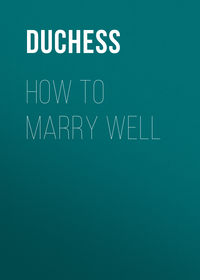 полная версия
полная версияAiry Fairy Lilian
"Lilian, listen to me – "
"No, I will not. I wonder why you come near me at all. Go back to Florence; she is so calm, so sweet, so —somnolent," – with a sneer, – "that she will not ruffle your temper. As for me, I hate disagreeable people! Why do you speak to me? It does neither of us any good. It only makes you ill-mannered and me thoroughly unhappy."
"Unhappy!"
"Yes," petulantly, "miserable. Surely of late you must have noticed how I avoid you. It is nothing but scold, scold, scold, all the time I am with you; and I confess I don't fancy it. You might have known, without my telling you, that I detest being with you!"
"I shall remember it for the future," returns he, in a low voice, falling back a step or two, and speaking coldly, although his heart is beating wildly with passionate pain and anger.
"Thank you," retorts Lilian: "that is the kindest thing you have said to me for many a day."
Yet the moment his back is turned she regrets this rude speech, and all the many others she has given way to during the last fortnight. Her own incivility vexes her, wounds her to the heart's core, for, however mischievously inclined and quick-tempered she may be, she is marvelously warm-hearted and kindly and fond.
For full five minutes she walks to and fro, tormented by secret upbraidings, and then a revulsion sets in. What does it matter after all, she thinks, with an impatient shrug of her pretty soft shoulders. A little plain speaking will do him no harm, – in fact, may do him untold good. He has been so petted all his life long that a snubbing, however small, will enliven him, and make him see himself in his true colors. (What his true colors may be she does not specify even to herself.) And if he is so devoted to Florence, why, let him then spend his time with her, and not come lecturing other people on matters that don't concern him. Such a fuss about a simple emerald ring indeed! Could anything be more absurd?
Nevertheless she feels a keen desire for reconciliation; so much so that, later on, – just before dinner, – seeing Sir Guy in the shrubberies, walking up and down in deepest meditation, – evidently of the depressing order, – she makes up her mind to go and speak to him. Yes, she has been in the wrong; she will go to him, therefore, and make the amende honorable; and he (he is not altogether bad!) will doubtless rejoice to be friends with her again.
So thinking, she moves slowly though deliberately up to him, regarding the while with absolute fervor the exquisite though frail geranium blossom she carries in her hand. It is only partly opened, and is delicately tinted as her own skin.
When she is quite close to her guardian she raises her head, and instantly affects a deliciously surprised little manner at the fact of his unexpected (?) nearness.
"Ah, Sir Guy, you here?" she says, airily, with an apparent consummate forgetfulness of all past broils. "You are just in time: see what a lovely flower I have for you. Is not the color perfect? Is it not sweet?" proffering to him the pale geranium.
"It is," replies he, taking the flower mechanically, because it is held out to him, but hardly looking at it. His face is pale with suppressed anger, his lips are closely set beneath his fair moustache; she is evidently not forgiven. "And yet I think," he says, slowly, "if you knew my opinion of you, you would be the last to offer me a flower."
"And what then is your opinion?" demands Lilian, growing whiter and whiter until all her pretty face has faded to the "paleness o' the pearl." Instinctively she recoils a little, as though some slight blow has touched and shaken her.
"I think you a heartless coquette," returns he, distinctly, in a low tone that literally rings with passion. "Take back your gift. Why should you waste it upon one who does not care to have it?" And, flinging the flower contemptuously at her feet, he turns and departs.
For a full minute Miss Chesney neither stirs nor speaks. When he is quite gone, she straightens herself, and draws her breath sharply.
"Well, I never!" she says, between her little white teeth, which is a homely phrase borrowed from nurse, but very expressive, and with that she plants a small foot viciously upon the unoffending flower and crushes it out of all shape and recognition.
* * * * * * *Dinner is over, and almost forgotten; conversation flags. Even to the most wakeful it occurs that it must be bordering upon bed-hour.
Lilian, whose nightly habit is to read for an hour or two in her bed before going to sleep, remembering she has left her book where she took off her hat on coming into the house some hours ago, leaves the drawing-room, and, having crossed the large hall, turns into the smaller one that leads to the library.
Midway in this passage one lamp is burning; the three others (because of some inscrutable reason known only to the under-footman) have not been lit: consequently to-night this hall is in semi-darkness.
Almost at the very end of it Miss Chesney finds herself face to face with her guardian, and, impelled by mischief and coquetry, stops short to confront him.
"Well, Sir Guy, have you got the better of your naughty temper?" she asks, saucily. "Fie, to keep a little wicked black dog upon your shoulder for so long! I hope by this time you are properly ashamed of yourself, and that you are ready to promise me never to do it again."
Guy is silent. He is thinking how lovely she is, how indifferent to him, how unattainable.
"Still unrepentant," goes on Lilian, with a mocking smile: "you are a more hardened sinner than ever I gave you credit for. And what is it all about, pray? What has vexed you? Was it my cousin's ring? or my refusing to accompany you to-morrow to Mrs. Boileau's?"
"Both," replies he, feeling compelled to answer. "I still think you should not wear your cousin's ring unless engaged to him."
"Nor yours either, of course," with a frown. "How you do love going over the same ground again and again! Well," determinately, "as I told you before, I shall wear both – do you hear? – just as long as I please. So now, my puissant guardian," with a gesture that is almost a challenge, "I defy you, and dare you to do your worst."
Her tone, as is intended, irritates him; her beauty, her open though childish defiance madden him. Gazing at her in the uncertain light, through which her golden hair and gleaming sapphire eyes shine clearly, he loses all self-control, and in another moment has her in his arms, and has kissed her once, twice, passionately.
Then recollection, all too late, returns, and shocked, horrified at his own conduct, he releases her, and, leaning against the wall with folded arms and lowered eyes, awaits his doom.
Standing where he has left her, pale as a little colorless ghost, with her lips as white as death, and her great eyes grown black through mingled terror and amazement, Lilian regards him silently. She does not move, she scarcely seems to breathe; no faintest sound of anger escapes her. Then slowly – slowly raising her handkerchief, she draws it lightly across her lips, and with a gesture full of contempt and loathing flings it far from her. After which she draws herself up to her extremest height, and, with her head erect and her whole figure suggestive of insulted pride and dignity, she sweeps past him into the library, closing the door quietly behind her.
When the last sound of her footsteps has disappeared, Guy rouses himself as if from a hateful dream, and presses his hand to his forehead. Stooping, he picks up the disdained handkerchief, that lies mournfully in the corner, thrusts it into his bosom, and turning away toward his own quarters, is seen no more that night.
CHAPTER XVIII
"The best laid schemes o' mice and menGang aft a-gley,And lea'e us nought but grief and pain,For promised joy." – Burns.All next day Lilian treats him as though to her eyes he is invisible. She bestows upon him none of the usual courtesies of life; she takes no "good-morrow," nor gives one. She is singularly deaf when he speaks; except when common etiquette compels her to return an answer to one or other of his speeches, she is dumb to him, or, when thus compelled, makes an answer in her iciest tones.
At five o'clock they all start for the Grange, Mrs. Boileau being one of those unpleasant people who think they can never see enough of their guests, or that their guests can never see enough of them, – I am not sure which, – and who consequently has asked them to come early, to inspect her gardens and walk through her grounds before dinner.
As the grounds are well worth seeing, and the evening is charming for strolling, this is about the pleasantest part of the entertainment. At least so thinks Lilian, who (seeing Guy's evident depression) is in radiant spirits. So does Archibald, who follows her as her shadow. They are both delighted at everything about the Grange, and wander hither and thither, looking and admiring as they go.
And indeed it is a charming old place, older perhaps than Chetwoode, though smaller and less imposing. The ivy has clambered up over all its ancient walls and towers and battlements, until it presents to the eye a sheet of darkest, richest green, through which the old-fashioned casements peep in picturesque disorder, hardly two windows being in a line.
Inside, steps are to be met with everywhere in the most unexpected places, – curious doors leading one never knows where, – ghostly corridors along which at dead of night armed knights of by-gone days might tramp, their armor clanking, – winding stairs, – and tapestries that tell of warriors brave and maidens fair, long since buried and forgotten.
Outside, the gardens are lovely and rich in blossom. Here, too, the old world seems to have lingered, the very flowers themselves, though born yesterday, having all the grace and modesty of an age gone by.
Here
"The oxlips and the nodding violet grow:Quite over-canopied with lush woodbine,with sweet musk-roses and with eglantine."Here too the "nun-like lily" hangs its head, the sweet "neglected wall-flower" blows, the gaudy sunflower glitters, and the "pale jessamine, the white pink, and the pansy freaked with jet," display their charms; while among them, towering over all through the might of its majesty, shines the rose, – "Joy's own flower," as Felicia Hemans sweetly calls it.
Now – being late in the season – the blossom is more scarce, though still the air is heavy with delicate perfume, and the eyes grow drunk with gazing on the beauty of the autumn flowers. Through them goes Lilian, with Archibald gladly following.
All day long he has had her to himself, and she has been so good to him, so evidently pleased and contented with his society alone, that within his breast an earnest hope has risen, so strongly, that he only waits a fitting opportunity to lay his heart and fortune at her feet.
"I can walk no more," says Lilian, at last, sinking upon the grass beneath the shade of a huge beech that spreads its kindly arms above her. "Let us sit here and talk."
Archibald throws himself beside her, and for a few minutes silence reigns supreme.
"Well?" says Lilian, at length, turning lazy though inquisitive eyes upon her companion.
"Well?" says Archibald in return.
"I said you were to talk," remarks Lilian, in an aggrieved tone. "And you have not said one word yet. You ought to know by this time how I dislike silence."
"Blame yourself: I have been racking my brains without success for the last two minutes to try to find something suitable to say. Did you ever notice how, when one person says to another, 'Come, let us talk,' that other is suddenly stricken with hopeless stupidity? So it is now with me: I cannot talk: I am greatly afraid."
"Well, I can," says Lilian, "and as I insist on your doing so also, I shall ask you questions that require an answer. First, then, did you ever receive a note from me on my leaving the Park, asking you to take care of my birds?"
"Yes."
"And you fed them?"
"Regularly," says Archibald, telling a fearful lie deliberately, as from the day he read that note to this he has never once remembered the feathered friends she mentions, and even now as he speaks has only the very haziest idea of what she means.
"I am glad of that," regarding him searchingly. "It would make me unhappy to think they had been neglected."
"Don't be unhappy, then," returning her gaze calmly and unflinchingly: "they are all right: I took care of that." His manner is truthful in the extreme, his eyes meet hers reassuringly. It is many years since Mr. Chesney first learned the advantage to be derived from an impassive countenance. And now with Lilian's keen blue eyes looking him through and through, he feels doubly thankful that practice has made him so perfect in the art of suppressing his real thoughts. He has also learned the wisdom of the old maxim, —
"When you tell a lie, tell a good one,When you tell a good one, stick to it,"and sticks to his accordingly.
"I am so pleased!" says Lilian, after a slight pause, during which she tells herself young men are not so wretchedly thoughtless after all, and that Archibald is quite an example to his sex in the matter of good nature. "One of my chiefest regrets on leaving home was thinking how my birds would miss me."
"I am sorry you ever left it."
"So am I, of course. I was very near declining to do so at the last moment. It took Aunt Priscilla a full week to convince me of the error of my ways, and prove to me that I could not live alone with a gay and (as she hinted) wicked bachelor."
"I have never been so unfortunate as to meet her," says Archibald, mildly, "but I would bet any money your Aunt Priscilla is a highly objectionable and interfering old maid."
"No, she is not: she is a very good woman, and quite an old dear in some ways."
"She is an old maid?" raising himself on his elbow with some show of interest.
"Well, yes, she is; but I like old maids," says Lilian, stoutly.
"Oh, she likes old maids," says Mr. Chesney, sotto voce, sinking back once more into his lounging position. He evidently considers there is nothing more to be said on that head. "And so she wouldn't let you stay?"
"No. You should have seen her face when I suggested writing to you to ask if I might have a suite of rooms for my own use, promising faithfully never to interfere with you in any way. It was a picture!"
"It pained you very much to leave the Park?"
"It was death to me. Remember, it had been my home all my life; every stick and stone about the place was dear to me."
"It was downright brutal, my turning you out," says Archibald, warmly: "I could hate myself when I think of it. But I knew nothing of it, and – I had not seen you then."
"If you had, would you have let me stay on?"
"I think so," returns he, softly, gazing with dangerous tenderness at the delicate rose-tinted face above him. Then, "Even so, I wish you had asked me; I so seldom go near the place, you would have been thoroughly welcome to stay on in it, had you been the ugliest person breathing."
"So I said at the time, but Aunt Priscilla would not hear of it. I am sure I heard enough about the proprieties at that time to last me all my life. When all arguments failed," says Miss Chesney, breaking into a gay laugh, as recollection crowds upon her, "I proposed one last expedient that nearly drove auntie wild with horror. What do you think it was?"
"Tell me."
"I said I would ask your hand in marriage, and so put an end to all slanderous tongues; that is, if you consented to have me. See what a narrow escape you had," says Lilian, her merriment increasing: "it would have been so awkward to refuse!"
Archibald gazes at her earnestly. He has been through the hands of a good many women in his time, but now confesses himself fairly puzzled. Is her laughter genuine? is it coquetry? or simply amusement?
"Had you ever a proposal, Lilian?" asks he, quietly, his eyes still riveted upon her face.
"No," surprised: "what an odd question! I suppose it is humiliating to think that up to this no man has thought me worth loving. I often imagine it all," says Lilian, confidentially, taking her knees into her embrace, and letting her eyes wander dreamily over to the hills far away behind the swaying trees. "And I dare say some day my curiosity will be gratified. But I do hope he won't write: I should like to see him do it. I wouldn't," says Miss Chesney, solemnly, "give a pin for a man who wouldn't go down on his knees to his lady-love."
This last remark under the circumstances is eminently unwise. A moment later Lilian is made aware of it by the fact of Archibald's rising and going down deliberately on his knees before her.
"It can scarcely be news to you to tell you I love you," says he, eagerly. "Lilian, will you marry me?"
"What are you saying?" says Miss Chesney, half frightened, half amused: "you must be going mad! Do get up, Archie: you cannot think how ridiculous you look."
"Tell me you will marry me," entreats that young man, unmoved even by the fact of his appearing grotesque in the eyes of his beloved.
"No; I will not," shaking her head. "Archie, do move: there is the most dreadful spider creeping up your leg."
"I don't care; let him creep," says Archibald, valiantly; "I shan't stir until you give me a kind answer."
"I don't know what to say; and besides I can do nothing but laugh while you maintain your present position. Get up instantly, you foolish boy: you are ruining the knees of your best trousers."
Whether this thought carries weight with Mr. Chesney I know not, but certainly he rises to his feet without further demur.
"You spoke about the Park a few minutes ago," he says, slowly; "you know now you can have it back again if you will."
"But not in that way. Did you think I was hinting?" growing rather red. "No; please don't say another word. I wonder you can be so silly."
"Silly!" somewhat aggrieved; "I don't know what you mean by that. Surely a fellow may ask a woman to marry him without being termed 'silly.' I ask you again now. Lilian, will you marry me?"
"No, no, no, certainly not. I have no intention of marrying any one for years to come, – if ever. I think," with a charming pout, "it is very unkind of you to say such things to me, – and just when we were such good friends too; spoiling everything. I shall never be comfortable in your society again; I'm sure I never should have suspected you of such a thing. If I had – " A pause.
"You would not have come here with me to-day, you mean?" gloomily.
"Indeed I should not. Nothing would have induced me. You have put me out terribly."
"I suppose you like Chetwoode," says Archibald, still more gloomily. Having never been denied anything since his birth, he cannot bring himself to accept this crowning misfortune with becoming grace.
"I like everybody, – except Florence," returns Lilian, composedly.
Then there is another pause, rather longer than the first, and then – after a violent struggle with her better feelings – Miss Chesney gives way, and laughs long and heartily.
"My dear Archibald, don't look so woe-begone," she says. "If you could only see yourself! You look as though every relation you ever had was dead. Why, you ought to be very much obliged to me. Have you never heard Mr. Punch's advice to young men about to marry?"
"I don't want any one's advice; it is late for that, I fancy. Lilian – darling —darling– won't you – "
"I won't, indeed," recoiling and waving him back, while feeling for the first time slightly embarrassed; "don't come a step nearer; nobody ever made love to me before, and I perfectly hate it! I hope sincerely no one will ever propose to me again."
"I shall!" doggedly; "I shan't give you up yet. You have not thought about it. When you know me better you may change your mind."
"Do not deceive yourself," gently, "and do not be offended. It is not you I have an objection to, it is marriage generally. I have only begun my life, and a husband must be such a bore. Any number of people have told me so."
"Old maids, such as your Aunt Priscilla, I dare say," says Archibald, scornfully. "Don't believe them. I wouldn't bore you: you should have everything exactly your own way."
"I have that now."
"And I will wait for you as long as you please."
"So you may," gayly; "but mind, I don't desire you.
"May I take that as a grain of hope?" demands he, eagerly grasping this poor shadow of a crumb with avidity, only to find later on it is no crumb at all. "Don't be cruel, Lilian: every one thinks differently after a while; you may also. You have said I am not hateful to you; if then you would only promise to think it over – "
"Impossible," airily: "I never think: it is too fatiguing. So are you, by the bye, just now. I shan't stay with you any longer, lest I should be infected. Good-bye, Archie; when you are in a pleasanter mood you can return to me, but until then adieu."
So saying, she catches her train in one hand and runs away from him fast as her fleet little feet can carry her.
Down the pathway, round under the limes, into another path runs she, where suddenly she finds herself in Taffy's presence.
"Whither away, fair maid?" asks that youth, removing the cigar from his lips that he is enjoying all alone.
"I am running away from Archie. He was so excessively dull and disagreeable that I could not bring myself to waste another moment on him, so I ran away and left him just planté là," says Miss Chesney, with a little foreign gesture and a delicious laugh that rings far through the clear air, and reaches Archibald's ears as he draws nearer.
"Come, I hear footsteps," whispers she, slipping her hand into Taffy's. "Help me to hide from him."
So together they scamper still farther away, until at last they arrive breathless but secure in the shrubberies that surround one side of the house.
When they have quite recovered themselves, it occurs to Taffy that he would like to know all about it.
"What was he saying to you?" asks he à propos of Chesney.
"Nothing," promptly.
Taffy, curiously: "Well, certainly that was very disagreeable."
Lilian, demurely: "It was."
At this Taffy lays his hands upon her shoulders and gives her a good shake.
"Tell me directly," says he, "what he was saying to you."
"How can I?" innocently; "he says so much and none of it worth repeating."
"Was he making love to you?"
"No. Oh, no," mildly.
"I'm certain he was," with conviction. "And look here, Lil, don't you have anything to do with him: he isn't up to the mark by any means. He is too dark, and there is something queer about his eyes. I once saw a man who had cut the throats of his mother, his grandmother, and all his nearest relations, – any amount of them, – and his eyes were just like Chesney's. Don't marry him, whatever you do."
"I won't," laughing: "I should hate to have my throat cut."
"There's Chetwoode, now," says Taffy, who begins to think himself a very deep and delicate diplomatist. "He is a very decent fellow all round if you like."
"I do like, certainly. It is quite a comfort to know Sir Guy is not indecent."
"Oh, you know what I mean well enough. There's nothing underhand about Chetwoode. By the bye, what have you been doing to him? He is awfully down on his luck all day."
"I!" coldly. "What should I do to Sir Guy?"
"I don't know, I'm sure, but girls have a horrid way of teasing a fellow while pretending to be perfectly civil to him all the time. It is my private opinion," says Mr. Musgrave, mysteriously, – "and I flatter myself I am seldom wrong, – that he is dead spoons on you."
"Really, Taffy!" begins Lilian, angrily.
"Yes, he is: you take my word for it. I'm rather a judge in such matters. Bet you a fiver," says Mr. Musgrave, "he proposes to you before the year is out."
"I wonder, Taffy, how you can be so vulgar!" says Lilian, with crimson cheeks, and a fine show of superior breeding. "I never bet. I forbid you to speak to me on this subject again. Sir Guy, I assure you, has as much intention of proposing to me as I have of accepting him should he do so."
"More fool you," says Taffy, unabashed. "I'm sure he is much nicer than that melancholy Chesney. If I were a girl I should marry him straight off."









